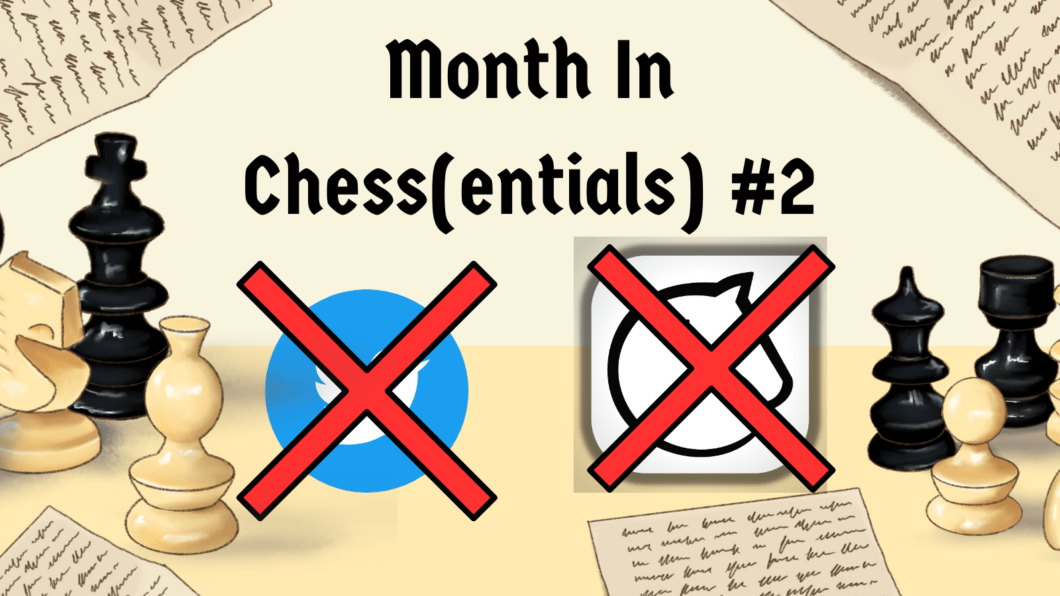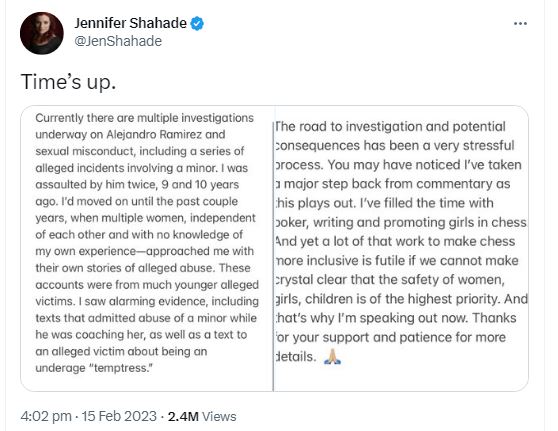Table of Contents
Month in Chessentials #2
Hello, dear reader, and welcome back to the second edition of the Month in Chess(entials), a monthly newsletter in which we go over the most important chess tournament, games, and chess news that unfolded in the previous month and in which the author of these lines also bores you to death with things that have been happening in his (chess) life.
February 2023 was an extremely rich and busy month, both in terms of the number of tournaments/events going on in the chess world, as well as for the author of these lines personally – mainly (but not exclusively) due to the start of the 2023 Pro Chess League Season.
But I am getting ahead of myself! Let’s start our recap of the previous month in chess(entials) by taking a look at the most notable tournaments that unfolded over the course of the last thirty days.
Month in Chess
In contrast to January where seemingly the only event happening was the annual Tata Steel Chess tournament, the chess tournament scheduled for February was extremely stacked. FIDE events, private classical tournaments, online events, and chess leagues all unfolded one after another and it somehow became difficult to keep track of all the games and results.
Even so, I did manage to spend a decent amount of time looking at different games from different tournaments and following the results. The results of my “explorations” are summarized below.
FIDE Women Grand Prix
The month started with the 2nd leg of the FIDE Women Grand Prix – an integral part of the FIDE qualifying cycle for the Women’s World Chess Championship. The structure of the FIDE Grand Prix is not easy to explain, but basically – this series of tournaments are used to determine two participants in the Women’s Candidates Tournament. The second leg saw 12 of the total participants of the FIDE Grand Prix play (since every player has the right to play 3 out of 4 tournaments).
As will probably become apparent later in this newsletter, FIDE Women Grand Prix was somehow the tournament I followed the most. Partly it is because it was the first tournament of the month so my „chess hunger“ was still relatively fresh, but it is also partly due to a significant increase in obligations later in the month.
Anyway, from the very beginning of the tournament, Russian GM Alexandra Kosteniuk, well known for her online/Twitch handle „ChessQueen“ took the lead by winning her first four (!!) games. Even though her openings didn’t always work perfectly, she demonstrated an amazing fighting spirit and resourcefulness. Her game against Tan Zhongyi was very typical in that regard:
Now, when someone starts the tournament with 4/4, you’d expect that the outcome is almost decided and that the remaining rounds are „smooth sailing“. However, FIDE Women Grand Prix turned out to be a very fiery race until the very end – largely due to the tremendous performance of the Indian legend, GM Humphy Koneru. Despite starting with the three draws, Koneru kept playing at a very high level and slowly reducing the gap between her and the tournament leader Kosteniuk. Along the way, she missed several opportunities to score even more points, for example, in her game against WGM Zhu Jiner:
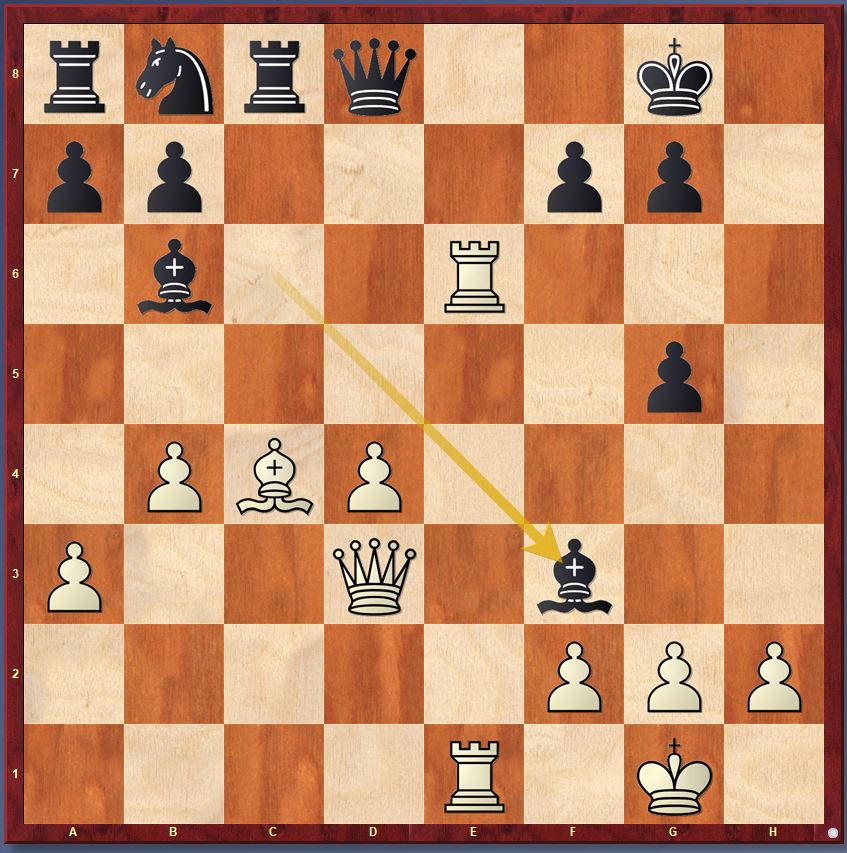
Koneru is completely winning here with the majestic shot Rh6!!
Despite the missed opportunities, Koneru remained within striking distance from Kosteniuk. The decisive clash of the tournament leaders happened in the penultimate, 10th round of the tournament – and it didn’t disappoint. Despite being completely winning for the larger portion of the game, Koneru let her opponent escape.
With the draw in the final round, Kosteniuk secured the overall victory in the tournament, since Koneru also failed to win her last-round game against Tan Zhongyi (ending up half a point behind).
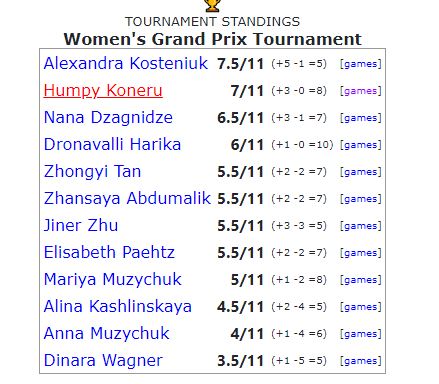
Source: Chessgames.com
Airthings Masters 2023
The second big tournament that started somewhere in the middle of the Women’s Grand Prix was the first leg of the revised and revamped Champions Chess Tour – Airthing Masters. Following the merger of chess.com and chess24, the Global Chess Championship and the Champions Chess Tour were also merged into a new competition with an established name – featuring a completely new and fairly complicated format. It took me quite some time to figure it out and it is still not 100% clear to me, but in layman’s terms:
- Every leg of the Champions Chess Tour is open to all titled players. Non-GM players first have to compete in qualifying events which allow them to play in the so-called „Play-In“ stage, which is open to all GMshe Play-In tournament is a 9-round rapid Swiss, which is followed by a series of knock-out matches.
- On the basis of the results of this tournament, a total of 76 players are distributed into three divisions, which are then conducted using the so-called double-elimination format
- All participants in all divisions earn some money as well as tour points (the amount of which depends on their exact spot, of course)
- The winner of division 1 qualifies directly for the big final of the entire Tour
Even though most attention was paid to the highest division, which was won convincingly by the invincible Magnus Carlsen, all three divisions were stacked with top players and full of interesting clashes and strong match-ups. For example, in the round 2 match of the Division 2 Loser’s bracket, former World Champion Vladimir Kramnik eliminated the current World Chess Championship Challenger Ian Nepomniachtchi on the White side of the seemingly innocuous Colle System:
But mentioning just one example doesn’t quite do justice to all the other interesting matches that were played over the course of the week. Let me, therefore, simply mention that Division 2 was won by Fabiano Caruana – who managed to prevail over Chinese GM Yu Yangyi in a very convincing fashion, while Division 3 was won by yet another American – Samuel Sevian – who managed to beat the Indian prodigy R. Praggnanandhaa in a very tightly contested match, after the latter blundered in a better position in the crucial game of the match:
In general, despite the confusing schedule and the abundance of matches/games, chess.com’s event page – featuring the draws of every division – made it very easy to keep track of the action and follow the results of the tournament. However, I do have to mention that results were the only thing I managed to keep track of. With such a sheer amount of matches and the sheer amount of games played within every single match, it was simply impossible to check them all.
Therefore, my main complaint about the Champions Chess Tour (and many other online/rapid events) is that the games seem to blend into a singular mass whose components can’t be distinguished.
WR Chess Masters
On the other hand, February was not all about online chess and the Champions Chess Tour. From the 15th to the 26th of February, a new classical super tournament – titled WR Chess Masters – was held in Düsseldorf for the first time in history. Despite the absence of the World Champion Magnus Carlsen, the tournament featured an impressive field featuring the mix of „veterans“ (Anish Giri, Wesley So, Levon Aronian) and youngsters (Nodirbek Abdusattorov, Jan-Krzysztof Duda, Dommaraju Gukesh, Vincent Keymer, Rameshbabu Praggnanandhaa, Andrey Esipenko), thus presenting the chess audience with yet another „clash of the generations“ – just a month after the end of the Tata Steel Chess 2023.
And once again it was the member of the „old generation“ who shined and took the trophy home. This time it was the turn of the oldest participant in the tournament, GM Levon Aronian, who has demonstrated he can still very much play at the highest level after he had a very bad year in 2022 (result-wise).
Initially, it seemed as if Levon will simply „run“ with it, as he started the tournament extremely well (with 4/5). His game against Nodirbek Abdusattorov was particularly one-sided, although it has to be said he was helped by the latter’s risky opening choice – I don’t recall when was the last time we have seen the Sicilian Dragon at the top level:
However, in the second half, he lost to Ian Nepomniachtchi and drew the rest of his games, including his last-round game against Gukesh where he settled for a quick draw with the White pieces, basically opting to go directly to the playoffs:
Alas, as much as I respect these two great players, I do think this practice of arranging draws and going for tiebreaks needs to be prevented as it is awfully anticlimactic. It almost seemed as if Caissa would punish them both when Nepo won his last-round game against Vincent Keymer and joined them in the tie-break, but after 6 hours of play, he obviously ran out of steam. The tiebreak – and thus the entire tournament – was won by Levon in the end, despite his ‘crime against chess’ in the last round of the classical portion.
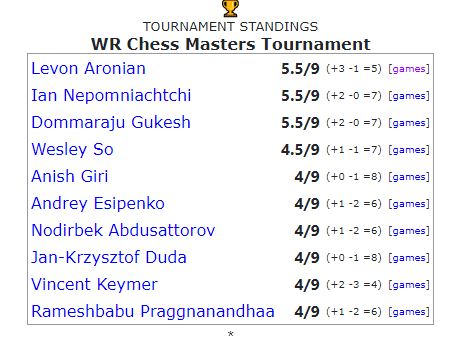
Source: Chessgames.com
Bundesliga
One of the main income sources for chess professionals who try to make a living purely by playing chess is various national chess leagues – especially in Europe. One of the strongest (and most lucrative) chess leagues – the German Bundesliga – continued in February with no less than five rounds being played over the span of the entire month.
Due to the fact that some of the strongest players in the world participate in it, Bundesliga is usually worth watching. For me as a Croat, extra interest is added by a huge contingent of Croatian Grandmasters that play for various teams – especially since this year some of the league dates clashed with the dates of the Pro Chess League and caused some headaches to me as a manager!
Finally, the Bundesliga should be of particular interest to the fervent listeners of the Chicken Chess Club Podcast due to the fact that one of the hosts – GM Laurent Fressinet – regularly participates. This year, he managed to ruin his „perfect“ drawing score by beating GM Martin Kraemer in a very nice positional fashion:
Chinese League Final 2022
While we are at different leagues – one event that was held in February that sparked my attention was the League Final held from 6th-11th February 2023. My interest was not the consequence of a particular affinity toward the Chinese chess scene – but rather the consequence of the fact that this competition saw the temporary return of the 2nd greatest female player of all time, GM Hou Yifan. Yifan played 6 games and scored 4 points. I can’t really tell you for which team she played or which team was ultimately crowned as the winner (mainly because I followed this one on lichess as it wasn’t available on chess24 – and lichess game viewer doesn’t really provide you with such info so easily…as of yet).
Let me, therefore, conclude this short segment with one of Hou Yifan’s games – one from the very first round against 2392-rated player Guo Qi. Perhaps it wasn’t smooth sailing, but that move 34.Kf1 is bound to leave you speechless.
Romanian National Championship
Another tournament that I followed superficially and sporadically was the Romanian National Championship. Not only did my personal acquaintance and a fellow full-time coach Vlad-Bogdan-Ghita participate. But quite a few people – most notably the renowned GM and coach Boris Avrukh – tweeted several interesting positions and games from this event – including the following beauty that is an early candidate for the game of the year 2023:
Alas, the tournament also got into the center of attention due to yet another cheating scandal that happened in the middle of it. The method was tried and tested – a player using the phone in the bathroom was caught because the arbiter displayed due diligence and went in the same cabin after he noticed very frequent toilet visits.
The scary part about this entire story is that the player was rated only 1698 and that he scored 0.5/4 in the tournament at the moment he was caught. I know I should be less paranoid about cheating, but instances such as these do nothing to curb that paranoia, given that they merely showcase that literally anyone can be tempted, irrespective of their rating or their tournament situation.
She Plays To Win International
Moving on to more positive topics. Given that I am a chess boyfriend, it is my sacred duty to follow any tournament in which WFM Maaike Keetman participates. In February, she was invited to Edinburgh to play the 2nd edition of the invitational WIM tournament titled „She Plays To Win International“, named after the non-profit organization She Plays To Win whose mission is too
„to encourage more girls to learn, play and benefit from chess.“
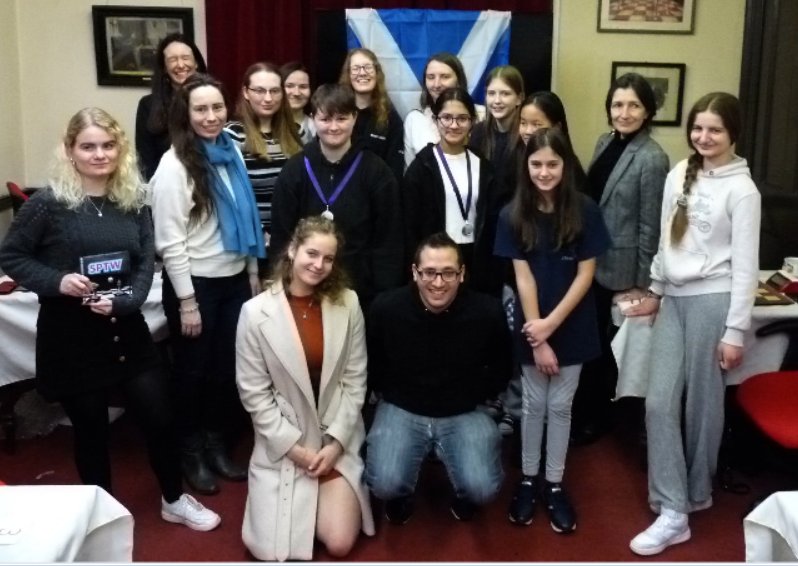
The participants of the tournament together with the participants of the side event. Great promotion of women’s chess. Source: ecforum
The tournament lineup consisted of 10 participants who battled over the course of just 5 days and grueling 9 rounds.
Now, in contrast to some shady closed tournaments held in Eastern Europe where certain higher-rated players collect their fee by handing a bunch of draws, here there were no such shenanigans. Apart from the few exceptions, the tournament was extremely fighting, with a bunch of decisive results and several games going on until the bare kings.
It was won by the 2nd seed – Slovakian WIM Svetlana Sucikova in an extremely dominant fashion (8/9). Maaike, unfortunately, didn’t manage to make the norm this time, although I can’t wait for her to give it another try. I am sure it is bound to happen sooner or later and it was very fun (and also quite stressful) for me to root for her from the distance!
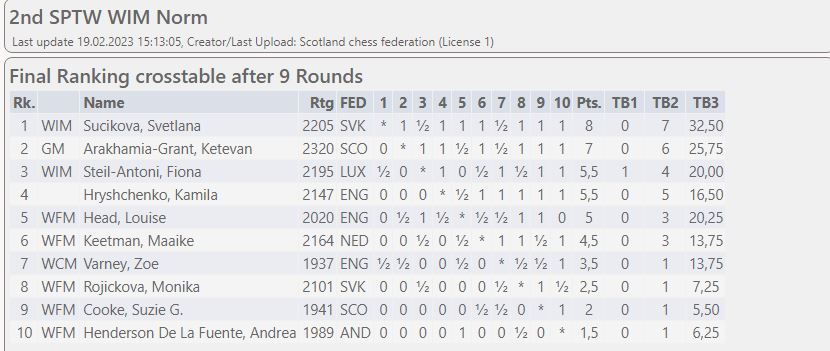
Source: Chessresults
Pro Chess League
Last, but not least – February also saw the beginning of the Pro Chess League – a team competition organized by chess.com. Since the author of these lines is also a manager of the team participating in the league, it was only natural that I followed it closely (and in certain cases even streamed it).
From the fan perspective, I think it is a very entertaining event due to the following:
- You have the opportunity to see lower-rated players playing top-level opposition they don’t get to play otherwise. And this mismatch quite often leads to massive upsets, although probably the biggest one of the season was the victory of German WGM Josefine Heinemann over none other than Hikaru Nakamura
- Due to the rating cap, the teams seem to be fairly balanced and matches are, in general, very close and tight. I don’t think we have had a tie yet, but several matches ended by a very narrow margin of 9-7 for the winner ( including one of our losses 🙁 )
- Irrespective of whether we are talking about Titled Tuesday, Champions Chess Tour, or Pro Chess League, players often seem to be a bit more nervous than usual when participating in these events – which can lead to some very dramatic mistakes, especially when faced with time pressure. The impact of major blunders and swindles is even more dramatic when it happens in TEAM events, but this element of NATURAL drama makes the entire competition very interesting to watch.
Other Chess News
Alejandro Ramirez accused by Jen Shahade for sexual misconduct
Even though February was filled with chess tournaments, in the domain of chess news it was not as rich as, say, January (or maybe it is just a consequence of me paying more attention to tournaments and games).
However, there was one major story that shook the chess world inside out. On February 15th, a well-renowned player, author, podcaster, female-chess ambassador, and Women Chess Program Director at US Chess, WGM Jen Shahade published a tweet publicly accusing a well-known commentator, coach, and former second of Fabiano Caruana, GM Alejandro Ramirez, of sexual misconduct toward her, as well as toward some other parties, some of which were even underage.
Source: Shahade’s Twitter
Given Shahade’s reputation and the fact she is not one to throw such accusations lightly, it was immediately taken seriously. Both Us Chess and Saint Louis Chess Club launched official investigations against Ramirez and some of his privileges at the club were already revoked. According to Jen, after her statement, several other parties approached her and stated that they themselves experienced similar behavior from Ramirez.
This story came as a big shock for the broader chess community, as Ramirez was extremely well-respected and generally perceived as a very nice and humble guy. Alas, as usual in these cases, it transpired afterward that his proclivity toward exhibiting such behavior was not completely unknown in the chess circles, but there weren’t any real consequences until Jen decided to come out! Even in the aftermath, many people who have personally known him have decided to be relatively quiet/plead ignorance. In the recent episode on the C-Squared Podcast, both Fabiano Caruana and Christian Chirilla commented these allegations came as a total shock, which is a bit hard to believe as usually there are at least minor signs somewhere along the way.
It just goes on to show that we as the chess community have a loooong way to go toward making the environment more inclusive and safer for women, as quick and clear condemnation shouldn’t happen after 8-9 years and due to the bravery of the individual.
Alireza Firouzja confirms he is pursuing a career in fashion alongside chess
Anyone who has been following the chess scene lately has noticed that one of the biggest talents of our time, Alireza Firouzja, didn’t play all that much in the preceding 8 months or so. Many speculated that this was due to his focus on a single-minded goal of becoming the World Champion. However, from a certain point, a rumor that Alireza is giving up chess to focus on a career in fashion started circulating.
Of course, everyone dismissed such an idea as quite ridiculous… until Alireza himself confirmed it during an interview with the popular streamer WFM Alessia Santeramo:
Alireza’s plan is to try to push it on both fronts and have an accomplished career in both fields. This decision might be considered somewhat unconventional and it probably even angered some die-hard chess fans who want to see him play more.
But I agree with prevalent sentiments that he doesn’t really own the chess world anything. If fashion is a career he wants to pursue, we should all be happy for him and wish him all the best in that endeavor!
Russian Chess Federation Switches to Asia
Last but not least, allow me to „bore“ you with a little bit of chess politics. Due to the restrictions imposed on the Russian Chess Federation by the European Chess Union, at the beginning of February, the Russian Chess Federation applied for membership in the Asian Chess Federation – which was officially approved on the 28th of February. Chess, therefore, becomes the very first sport in which a federation tries to dodge the sanctions imposed on them and their players by switching federations in this manner.
Now, a whole debate could be held about the point of these sanctions. I fully agree with the opinion expressed by Fabiano Caruana in a recent episode of the C-Squared Podcast – banning athletes for the crimes of their home country seems a little bit harsh to me – especially since you could easily stretch this ethical principle to any other country in severe violation of human rights and international law (hello Saudi Arabia!).
But irrespective of your opinion on the matter, it does seem a little bit ridiculous that such a large federation can simply join a different continental federation just like that.
But what do I know anyway?
Month In Chessentials
Pro Chess League
February was not only a busy month in terms of the chess tournament schedule – it was also one of the busiest months of my life.
One of the biggest reasons was the start of the Pro Chess League 2023, in which the team I manage – Croatia Bulldogs – participates. Even though a number of preparatory actions were done before the season started, the fact that matches are played on a weekly basis means that there is a number of things to be done on a weekly basis, such as:
- Communicating with my team members and the chess.com staff, deciding who will play every week, and forwarding that info to the chesscom.staff
- Creating promotional materials (trailers such as this one) before every match
- Updating the data on the website, creating info about our future matches, entering the results of the matches
- Writing a report after the match (which often happens on a weekend because we played the first two matches on a Friday) preparing lichess studies with highlights and filming a video with highlights
- Streaming the event and making sure everything is in order with the players throughout the match
Perhaps these tasks don’t sound too daunting in isolation, but when combined they do amount to a significant amount of work – and I have to admit I somewhat underestimated it. It is true that most of these steps are self-imposed and maybe not necessary, but I want to do this job competently if I am doing it and I have never been the best at deciding where to make a cut.
Oh, and I almost forgot to mention! We have played two matches so far (at the moment of writing), winning one and losing one. I will not delve too deeply into the details of these matches – if you want to find out more, please check some of the reports I have written where the matches are analyzed to the tiniest detail.
What I wrote?
Naturally, with all the effort and writing required for the needs of the Pro Chess League (and other endeavors), I didn’t really have much time/energy left to devote to serious writing. Fortunately, the amount of non-PCL writing did not amount to zero, as I did manage to start the project of accompanying my opening videos with articles and .pgns in written form.
Thus, in February I published three articles devoted to the Classical Variation, McCutcheon Variation, and the Alekhine-Chatard Attack of the French Defence. I do hope to continue this opening series – among other things – sometime in the future.
(Also note that I started publishing these articles on the lichess blog, as well, before I got muted – more on that shortly)
What I filmed?
Similarly, as with writing, the majority of my “video” hours went into creating materials for the need of the Pro Chess League – trailers, broadcasts, recaps, Meet The Bulldogs series, etc. I did manage to mix it every now and then by posting a historical video from the Steinitz-Zukertort match or an opening video, but if I were to single out a particular video that I am very proud of it is the video of my private lesson with one of my long-term students.
I was quite satisfied with how that lesson went (in front of the camera!) and people who have watched it seem to have extracted some value out of it, so if there is one video I would suggest you watch from my library, it would probably be that one.
You can find out more by simply visiting my Youtube channel.
100 Repertoires: Alekhine Defence
As I mentioned in my previous newsletter, after I published my previous Chessable course I immediately signed a new one, on the topic of the Alekhine Defence. Naturally, with all the stuff related to the Pro Chess League, in February I had less time to devote to this project, but I did do some work, given that the deadlines are rapidly approaching. I have finished all but one theoretical chapter, so I am not really doing that badly on this front. Although I also have to add all the additional chapters (Model Games, Thematic Tactics, Key Ideas, etc.) so there is some work still to be done in the upcoming weeks.
How I trained?
Now, one would expect that with such a busy schedule, my chess training would suffer. But somehow, I didn’t feel I was training chess that much less than usual (which probably means I overestimate the number of hours I spend working or the number of hours I usually put in chess. Possibly both!).
I managed to skip only one Killer Chess Training, I solved many Friendly Homeworks, I started solving exercises from a new book Imagination In Chess, I analyzed the games I haven’t yet analyzed from my most recent tournament and I even did some Chessable clicking on the side.
Since I am determined not to keep track of the hours I spend on chess as I feel adding more strings and structure to my hobby would be counterproductive, I can’t tell you what was the exact amount. But all in all, I did feel February was quite productive in that sense.
Which (chess) books did I read?
While my chess training didn’t suffer that much from the lack of time, I do feel that my chess reading did, as I hardly made any progress on the book Old Wine in New Bottles by Mihail Marin, which I started reading last month (and it is only partly because of the quality of the book itself). I did get started on a fantastic book Imagination In Chess by Paata Gaprindashvili which is basically a book featuring very creative and difficult puzzles – but for the moment I solved around 25 out of 500+ from the book (which is still not bad, mind you, given the level – but it can hardly be called hardcore book reading).
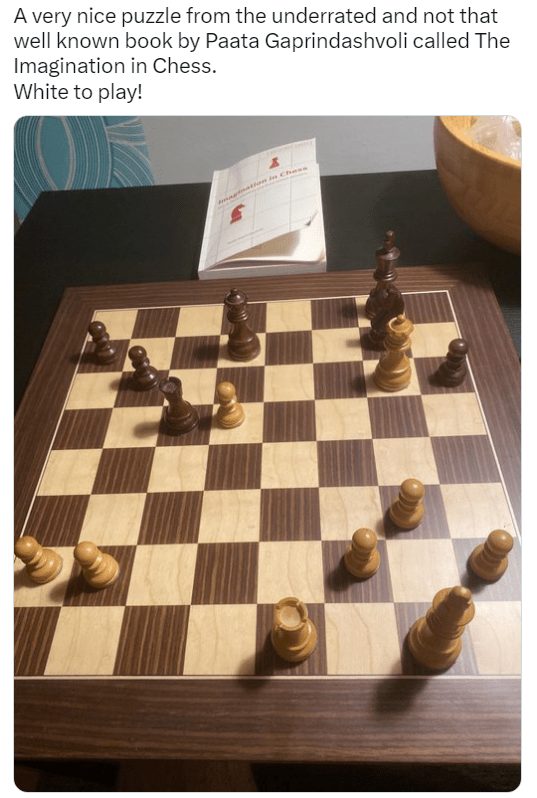
As for the non-chess reading – I did read the 2nd-ever book published by Stephen King, titled “Salem’s Lot”, but I wasn’t particularly impressed (partly because I am not the biggest fan of the “horror” genre, but also partly because I don’t particularly enjoy King’s character building and dialogues – it sounds quite bland and lacks any real depth).
On the other hand, I did get hooked on the Skyward series by Brandon Sanderson (one of the most prolific fiction writers nowadays who is well-known for his Mistborn trilogy and the fact he was the one who completed Robert Jordan’s Wheel of Time series after his death). I finished the first book titled Skyward in a matter of days – and am currently breezing through the second book, Starsight. It is one of those books that sucks you in and doesn’t let go – which is honestly true of all of Sanderson’s books.
What I played?
In February, I also spent less time playing chess than usual. Partly it is due to the more busy schedule, but partly it also has something to do with the fact that I lost some motivation/will to play after a degenerate night session led to me getting muted on lichess again (as I will elaborate in more detail below).
With that being said, I did play in an actual OTB competition this month. Last weekend in February, the regional qualifier for the Croatian Cup final was held, where the team I play for Dugo Selo participated. The event is played on 4-boards with the 30+30 tempo and is organized as a 5-round Swiss.
This is a very tough competition with a lot at stake, as only the winner gets the right to participate in the Cup Final. Alas, this year my team didn’t manage to qualify, as we lost our round 3 match against the young team of Samobor – partly because I managed to lose the following crucial game:
Alas, after this loss our chances to qualify were almost over, as we were trailing by both board and match points. In the end, we managed to beat the eventual winner Polet Buševec in a direct clash, but it was only sufficient for the overall second place, which was unfortunately not enough for us to make it through the Cup final.
Muted on Lichess?
Now, as I mentioned in the very title of this newsletter and as I foreshadowed in several places in this newsletter, in the month of February I have been muted on Lichess for bad behavior in the in-game chat… yet again. It was really hurtful because your coaching profile on lichess is disabled when you get muted. Your blogs are also not very visible, which I found particularly upsetting because the mute happened on the very same day when I published my second blog.
It is not the first time this has happened. I was muted once in the past for the very same reason and I managed to get a second chance from the Lichess administration team. I thought I have learned my lesson and that I wouldn’t repeat the same mistake, but for the umpteenth time, online chess managed to get the worst out of me and led me to write some stuff I would later regret (although I have to say the language wasn’t AS BAD as the first time, so there is at least something).
So why does it happen? Why do I transform into such an unpleasant human being when playing chess online? Are there any steps I have tried taking to get better at it?
Good questions. Let me preface them by saying that I am not ALWAYS such an unpleasant human being when playing online chess. These episodes very often (although not exclusively) happen when I am very anxious about something in my life. In these situations, I retort to using online chess as a mean to escape from the problems in life – and in those moments, the result in that single god-damn online game is the only thing that matters. It is not surprising that this happened in the month of February, when my schedule was extremely busy, due to which I felt anxious and overwhelmed throughout the month.
When you couple that with my compulsive/addictive personality and my inclination to do overly long sessions that sometimes span to the early morning hours, you get the final result. With a lack of sleep and a general realization that what I am doing is very degenerate, I am not in the best state – and in those moments losses get absolutely the worst out of me.
Even though I am a very competitive person, I don’t have a similar problem with any other activity. Hell, not even the losses in over-the-board chess have nearly the same effect – these angry episodes are almost exclusively limited to the domain of online chess.
And it is not like I haven’t tried working on it. I have spoken to several therapists, set rules for myself, switched time controls from bullet to blitz and rapid, tried blocking my chess-playing sites, etc. But no matter how I do, no matter how much I think I will be able to have it under control, in times when I am not at my best, when I get overwhelmed or very anxious, these episodes keep repeating.
In one of my therapy sessions, I blurted out that I am a happier person when I don’t play online chess, and I am very seriously considering not playing it at all – or playing it only against people I know. As much as I would like to think I am not the type of person who can get extremely angry and unpleasant after a loss in an online game, it seems to me that this part of my personality will always be there and that the only way of not triggering it is not exposing myself to situations where it can be triggered, to begin with.
Therefore, if we ever played a game of chess after which I was very unpleasant, I can only say I am sorry and that I deeply regret it. I genuinely feel ashamed for the fact that I got muted again – and not only because it hurts my personal brand/coaching business, but also because that is not the kind of person I want to be.
(I do plan to write a longer, unfiltered account of my history of struggle with online chess addiction under the title Confessions of an Internet Chess Degenerate, so stay tuned for that)
Canceled on Twitter?
While we are on these difficult topics that were foreshadowed in the title – those of you who follow me on Twitter know that I like to shove my opinions everywhere and that it has caused some people from the chess community to get offended in the past. On February the 9th I caused another round of Twitter “drama” after I decided to respond to a tweet by Levy Rozman a.k.a. Gotham Chess, as follows:
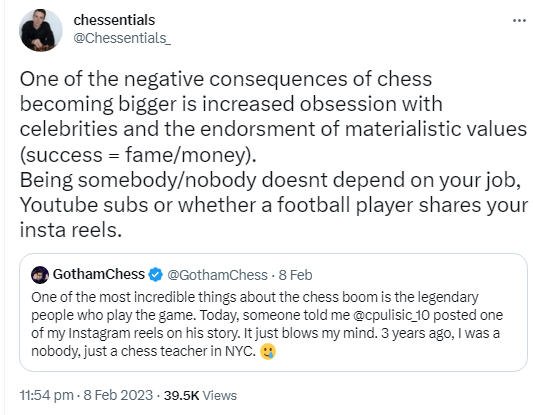
Even though I realized there is a very real possibility of him seeing this tweet, I didn’t really expect he would not ignore it and actually personally respond:

Alas, once he responded, an army of his followers and fans also appeared and commented on my tweet, showcasing their support in a very logical, polite, and constructive manner:
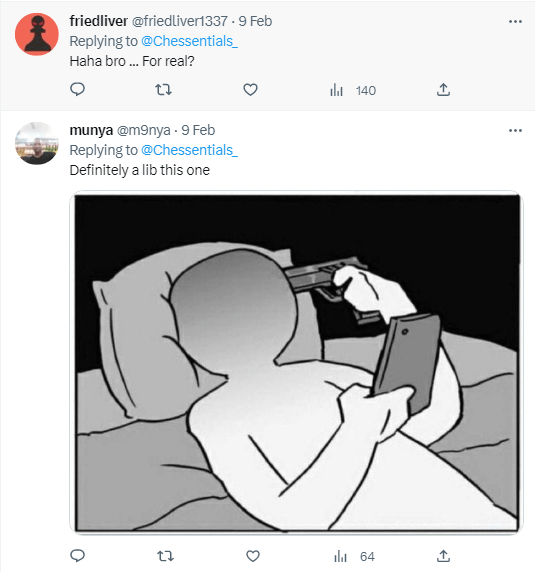
Fortunately, since this is not the first time I have had something like that happen on Twitter, I quickly realized the best way to deal with the influx of notifications is to simply mute them for this thread. So even though the comment section got quite nasty, I wasn’t that much affected – especially since people I also got some support from many people I know and respect.
With that being said, I do admit that my reaction seems a little bit extreme. When taken in isolation, Levy’s Tweet doesn’t necessarily make it look like there is a problem with celebrity obsession within the chess world (although I would still never publicly brag about someone sharing my video even if they did, no matter how famous they were).
However, when I look at it in the context of everything else that is happening within the chess world, I can’t simply pretend it is not part of a much larger picture. Even though the chess world has always had a tendency for “celebrity cults” (as rightfully pointed out by Howard Burton in his great book Chessays which I reviewed here), I feel that the rise of social media and online platforms made this tendency much more obvious and wide-spread (as in many other domains of human endeavor).
Especially when we also couple this with the unprecedented, chess boom that has been going on in the last few years. Suddenly, we not only have more and more celebrities playing the game – but we also have more and more people within the chess community obtaining celebrity status.
Now, I know you might be wondering – okay, but why would that be a bad thing? Doesn’t it simply promote chess and bring new people in? Why do you have to be such an elitist?
Well, while I agree it is true that this is what partly drives the rise of the game even further, I also think there are negative connotations. As I mentioned in my response to Levy’s tweet – one of the reasons why I personally dislike the celebrity culture is how closely it is tied to the promotion of materialistic values. Many people equate being famous/wealthy with being successful/happy, which I think is not only untrue – but incredibly problematic.
One of the most influential books I have ever read in my entire life, The High Price of Materialism, is centered around refuting this common preconception. I could quote numerous paragraphs from it to demonstrate a point, but for the sake of this newsletter, I have decided to content myself with the following one:
“Similarly, we have adopted a world view in which the worth and success of others is judged not by their apparent wisdom, kindness, or community contributions, but in terms of whether they possess the right clothes, the right car, and more generally, the right “stuff.
[…]
Existing scientific research on the value of materialism yields clear and consistent findings. People who are highly focused on materialistic values have lower personal well-being and psychological health than those who believe that materialistic pursuits are relatively unimportant.”
One of the major consequences of the recent “instagrammization” and “Twitchization” of chess is an increased obsession with materialistic values within the chess world. More and more discourse is held about money, views, number of users, etc. Prominent influencers are openly complaining about the lack of money/think the money is not sufficient, there is constant talk about potential records in terms of the number of visitors or subscribers or Twitch viewers and seemingly everything has to be about prize funds, clicks, or fame these days.
This is the true reason why I reacted to Levy’s tweet. I felt it is the continuation of the very same narrative which implies that success can only be achieved if you become famous or that celebrity shares your tweet.
Because otherwise, you are just a nobody.
I genuinely think such messaging is harmful to the individuals and the chess community as a whole – especially when it comes from the keyboard of the world’s biggest chess personality. Therefore, allow me to conclude this paragraph (and the entire newsletter) with yet another quote from the High Price of Materialism:
“One explanation involves the extent to which people have been exposed to the messages of consumer culture. For example, people are likely to be materialistic if they watch a great deal of television and if their parents value materialistic goals. So part of the answer is that some people simply learn this attitude or outlook because of their environment.”

